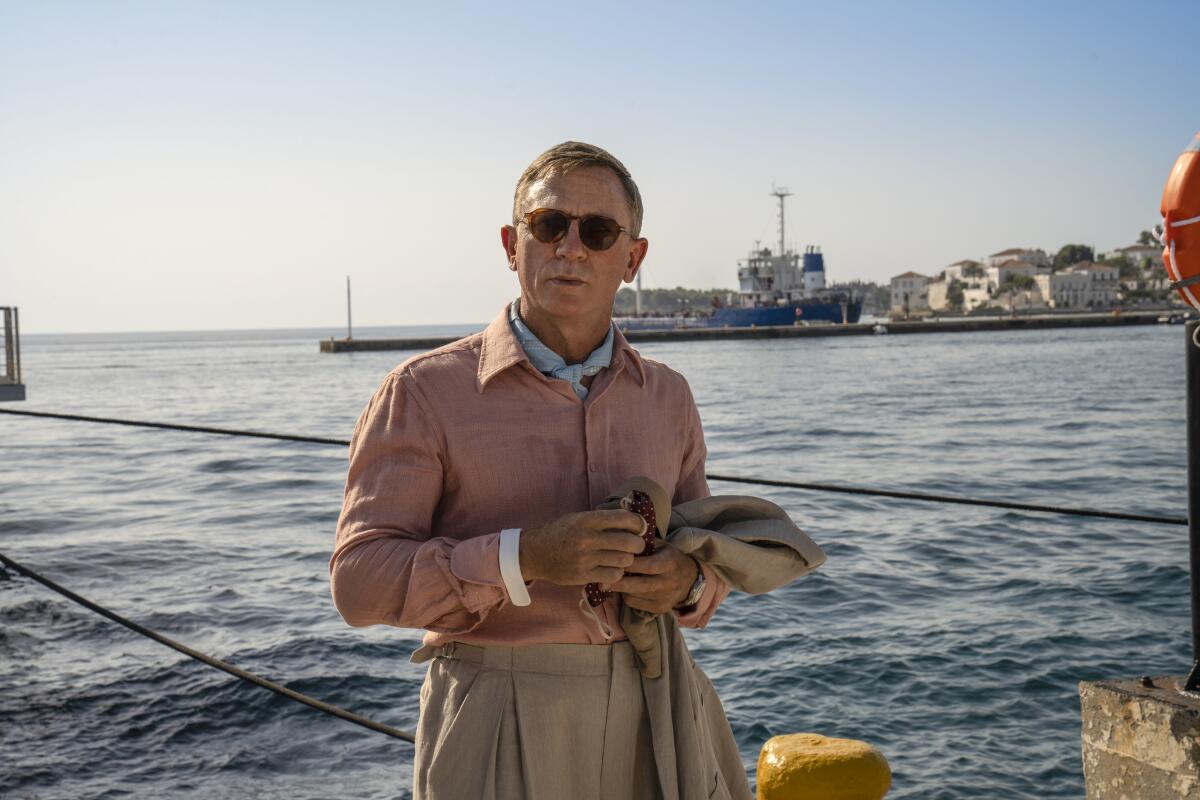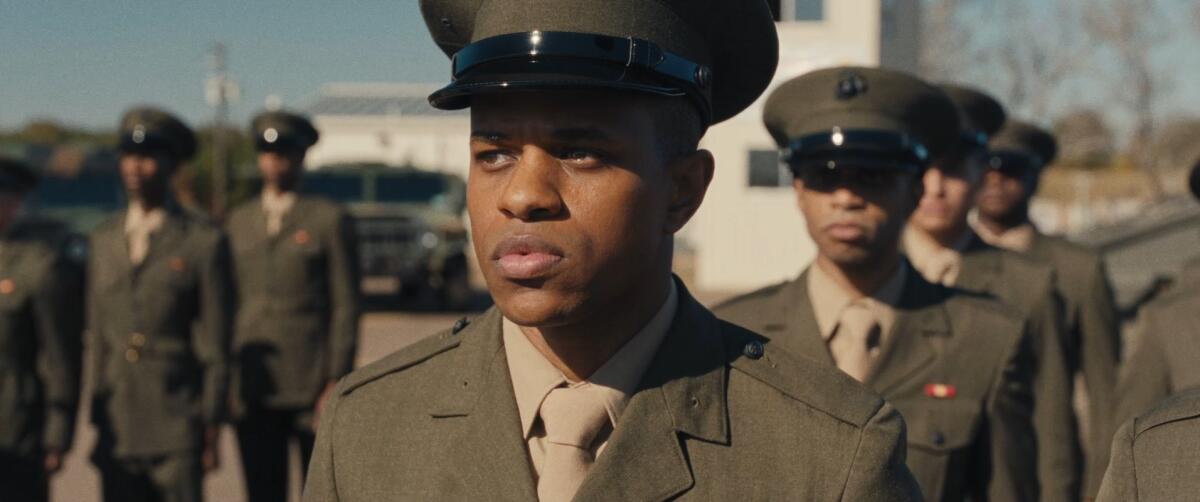Year-end’s most anticipated films with Holiday Movie Preview

Hello! I’m Mark Olsen. Welcome to another edition of your regular field guide to a world of Only Good Movies.
Only good movies
Get the Indie Focus newsletter, Mark Olsen's weekly guide to the world of cinema.
You may occasionally receive promotional content from the Los Angeles Times.
Holiday Movie Sneaks. This week sees the publication of our Holiday Movie Preview, a rundown on some of the most anticipated films between now and the end of the year.
Todd Martens wrote about James Cameron’s “Avatar: The Way of Water” in relation to Walt Disney World’s Pandora: The World of Avatar theme park attraction as an immersive extension of the films.
As Todd put it, “Visiting this real-life Pandora also changed the way I see the film. The militaristic aspects of the plot, with human raiders bent on destruction of the moon in order to harvest its natural resources, have over time faded into the background when I view “Avatar.” I forgive too its occasionally questionable politics, as many rightly view Sully as the embodiment of the ‘white savior’ narrative cliché. What lingers instead is its vision and its focus on the power of the dreamer, the experience of longing for peace, the desire for everlasting love and the possibility of being in concert with nature.”
Sarah-Tai Black spoke to Nikyatu Jusu about her film “Nanny,” which won the Grand Jury Prize at this year’s Sundance Film Festival. In the film a Senegalese woman, Aisha (Anna Diop), works as a nanny for an affluent white couple in New York City.
The film is a complex examination of cultural collision. As Jusu explained, “When Africans come here, they learn a hard lesson about Blackness. Nobody cares to know about your tribe, your region or your nation. I straddle those worlds, the disconnect between African and Black American histories. To show the ways that we share culture and tradition is a goal for me. It’s not just about the way we are oppressed — Blackness can often be flattened in that way — although that is, of course, important to speak to. It’s something that I’m constantly making sense of, what it means to be who I am here.”
Daniel Vaillancourt spoke to Ben Aldridge about his role in Michael Showalter’s “Spoiler Alert,” based on Michael Ausiello’s memoir. Aldridge co-stars alongside Jim Parsons as a happy couple who have to face one of them being diagnosed with a terminal illness.
“I don’t think you leave feeling sad or depressed,” Aldridge said. “You leave feeling inspired. … You can’t love without the risk of heartbreak. Michael’s book, and our movie, taught me to love better.”
Antoine Fuqua spoke to Josh Rottenberg about his slavery drama “Emancipation” starring Will Smith, and the obvious difficulties presented in the aftermath of the actor’s notorious slap at this year’s Oscars.
Of the time when it seemed the release of “Emancipation” might be delayed, Fuqua said, “I was worried, of course, as a filmmaker, because so many people worked on this film and gave their heart and soul. We had people on the movie who were homeless after the hurricane [Hurricane Ida in 2021]. It was tough. I like to see people recognized for their work in one way or the other, and I thought it would be a shame for it to never be seen by anyone. And I feel like the subject matter is bigger than that event.”
I spoke to Daniel Craig about returning to the role of Benoit Blanc in “Glass Onion: A Knives Out Mystery” now that he has left behind the role of James Bond in last year’s “No Time to Die.”
With a few years’ distance from when he finished shooting his last Bond, Craig responded to whether he has any newfound perspective on playing one of the most iconic roles in movie history.
“I’d love to give you a very succinct and proper answer to that, but I don’t think I have one,” Craig said. “It’s just too big of a thing to really get into a pithy comment. It’s been a large part of my life and has taken up most of my working life for the past 17, 18 years now. And to really put that into some sort of perspective, I don’t know if I’ll ever be able to do it. Really. It’s not that I’ll not want to, but to sort of sum it up, how does one sum that up?”
The Envelope podcast returns. The first episode of a new season of “The Envelope” podcast launched this week, with my conversation with Baz Luhrmann, director of one of the year’s biggest hits, “Elvis,” as well as “Moulin Rouge,” “The Great Gatsby” and more.
As to his hyperactive, idiosyncratic storytelling style, Luhrmann said, “I think the closer you get to telling a story the way you actually are, the more honest it’s gonna be. Now, is it gonna fit inside a box? Probably not. I’ve now kind of surrendered at my advanced years to this is just who I am and how I tell it.”
Enjoying this newsletter? Consider subscribing to the Los Angeles Times
Your support helps us deliver the news that matters most. Become a subscriber.
‘The Inspection’
Written and directed by Elegance Bratton in his feature debut, “The Inspection” is drawn from his life experiences. In the film, Ellis French (Jeremy Pope), a young gay Black man, has been kicked out of the house by his mother, Inez (Gabrielle Union), and, feeing he has nowhere else to turn, decides to enlist in the Marines. In basic training he faces new challenges and finds unexpected allies. The cast also includes Bokeem Woodbine and Raúl Castillo. The film is in theaters now.
For The Times, Justin Chang wrote, “[Bratton’s] skill with actors, however, is fully formed. For all the intense physicality of his performance, Pope does much of his acting with his eyes, which can signal fear and anxiety one moment and radiate a defiant seductiveness the next. … But the most revelatory performance here comes from Union, who as Inez distills half a lifetime’s worth of bitter disappointment into a few extraordinarily chilling scenes. With barely sublimated rage, she toes the perilously thin line between love and hate — and reminds you that while boot camp can pummel you into submission, the cruelest authoritarian mind games begin at home.”
Emily Zemler spoke to Bratton and Pope about their collaboration on the film. Summing up the experience, Bratton said, “I don’t think you could come from where I’ve come from and get here if you’re not an optimist. I’m optimistic about America. I’m optimistic about being Black and gay. I’m optimistic about the possibility of masculinity being a place of healing and not a place of trauma. I also believe that triumph is so sweet when it’s over adversity. I think that sometimes we’re afraid to face the adversity of the times that we live in because we don’t believe we can triumph. I wanted to create a movie that could inspire the belief that you can overcome.”
For Deadline, Valerie Complex wrote, “Ellis is hell-bent on getting Inez to notice him and his accomplishments. However, on the journey, he turns that hope inward and realizes he’s become a better man, despite his mother’s disapproval. That’s the ‘point’ of the military: to break the person you were and build you into someone new, someone aligned with the principles of the military-industrial complex. This person, who has a new sense of self, can let go of his mother and her toxic ways. He doesn’t need her acceptance. He found that within himself, in addition to his newly chosen family — the Marines. … ‘The Inspection’ is a strong first outing for the writer-director. It shows his ability to shape character and garner emotion from actors like Pope and Union, who give contemplative and emotional performances. Bratton has a bright future in Hollywood.”
For Vanity Fair, Richard Lawson wrote, “‘The Inspection’ feels like a cleanse for its filmmaker, a recounting that, one hopes, will finally give some sense of closure to a challenging period in Bratton’s life. Yet there is always an awareness of the audience in the film, of a broader range of experience, that is often lacking in memoir films like this. Which augurs good things for Bratton’s career to come. Now that he’s told this foundational story, I hope he feels he can seek out new and more far-ranging topics. His talent is considerably evident in ‘The Inspection,’ the product of training and reflection, yes, but also something innate that, it seems, no smothering force could suppress forever.”
For The Playlist, Robert Daniels wrote, “A self-affirming narrative about a young, houseless, gay Black man enlisting in the Marines to make his severe mother proud had the potential to offer audiences a queer insight into the cultural shortcomings of the armed forces. Considering the controversial implementation of ‘Don’t Ask, Don’t Tell’ and the continued homophobia present in that hyper-masculine environment, it’s a look behind the curtain worth making. But Bratton’s film lacks the tonal control and an eye on the larger picture to pull off such a feat. ‘The Inspection’ isn’t a bad movie. Rather it’s a disappointing slog because the arduous journey it sets up should have offered greater returns.”

Enjoying this newsletter? Consider subscribing to the Los Angeles Times
Your support helps us deliver the news that matters most. Become a subscriber.
‘She Said’
An adaptation of the book by Jodie Cantor and Megan Twohey about how they reported the New York Times story that revealed years of sexual abuse, harassment and cover-ups by Harvey Weinstein, “She Said” is directed by Maria Schrader from a screenplay by Rebecca Lenkiewicz. Starring Zoe Kazan and Carey Mulligan as Cantor and Twohey, respectively, the cast also includes Samantha Morton, Andre Braugher, Patricia Clarkson and Ashley Judd as herself. The movie is in theaters now.
For Tribune News Service, Katie Walsh wrote, “The emphasis in ‘She Said’ is on the process of information gathering and evidence, and it demonstrates how Kantor and Twohey did just that with the help of their team at the New York Times (Patricia Clarkson and Andre Braugher are particularly fantastic as tough but supportive editors Rebecca Corbett and Dean Baquet). Though merely telling this story is a decidedly feminist project, the focus is on the facts in this slow-burn drama that methodically builds to a moving and emotional crescendo. … With care, thoughtfulness and rigor, Schrader and the filmmakers of ‘She Said’ craft a film that shows the process of building this paradigm-shifting piece of journalism in a manner that is simultaneously thrilling and grindingly methodical.”
The Times’ Mary McNamara recently wrote about the five year anniversary of the Weinstein revelations and the elevation of #MeToo to a broader cultural movement: “As #MeToo turns 5 and Weinstein, already incarcerated, faces additional charges in an L.A. courtroom, I sometimes can’t believe what happened even though I was there when it did. … I want to believe that #MeToo has had a bigger and more significant legacy than putting Weinstein behind bars and removing a few abusive men from their positions of power. I want to believe that it has at least weakened the systems that allowed and even encouraged sexual harassment, challenged the ethos that frames sexual access as one of the spoils of success.”
For the Washington Post, Ann Hornaday wrote, “With the outcomes already so well-known, the value of an on-screen dramatization might be questionable. [‘She Said’] provides an engrossing, even galvanizing answer. At their best, screen versions of recent events can inscribe widely known facts on a deeper, more emotional level; they make the stakes higher and otherwise distant or abstract concepts more granular and human. ‘She Said’ takes a story we thought we knew and gives it new, utterly shattering life. … ‘She Said’ has earned its place in the pantheon of newspaper movies, if only because the filmmakers understand a fundamental truth: You can’t get the big things right unless you get the little things right, too.”
For the Hollywood Reporter, Lovia Gyarkye wrote, “Following in the tradition of its genre forebears (most recently, Tom McCarthy’s Oscar winner ‘Spotlight’) ‘She Said’ wraps the rush of toiling away at groundbreaking stories in the unglamorous affairs of everyday living. It also pokes at but can’t fully unravel a darker thesis: how intertwined and complicit many of us are in the systems that keep abusive men in power. (Brad Pitt, who recently had allegations leveled against him, is an executive producer.) Bringing justice requires a radical refocus and starting anew.”
For IndieWire, Kate Erbland wrote, “There is, of course, a dark irony to Weinstein — for so long such a Hollywood titan, a bonafide super-producer — getting taken down (again! and good! do it more!) via the kind of awards-y, end-of-year true-life tale the former Miramax head probably would have loved to make, back when he was, oh, you know, not in jail for multiple sex crimes. Hit him where it hurts. But it’s also bitterly hilarious that Weinstein’s downfall came at the hands of two women, the kind of tenacious, emotional, stressed, and heroic people he spent so much of his life and career trying to shut down. Dozens of films could be made about what Weinstein did, how Kantor and Twohey took him down, and the many lives his crimes disrupted, but Schrader’s would likely still be the best of the bunch, a definitive endeavor right out the gate.”

‘Bones and All’
Directed by Luca Guadagnino from a screenplay by David Kajganich, “Bones and All” is an adaptation of the young adult novel by Camille DeAngelis. In the film, set in the rural backroads of 1980s America, teenage Maren (Taylor Russell) is left on her own to find her way as an “eater,” driven by a compulsion to cannibalism. She meets the similarly afflicted Lee (Timothée Chalamet) and the two fall in love. The cast also includes Mark Rylance, Andre Holland, Michael Stuhlbarg, Jessica Harper, David Gordon Green and Chloë Sevigny. The film is in theaters now.
I reviewed the film for The Times, writing, “Part horror film, part coming-of-age tale, part romance, the adaptation of Camille DeAngelis’ young adult novel ‘Bones and All’ is a small marvel, unsettling and heartbreaking in equal measure. … Like the best young adult fiction, ‘Bones and All’ is sneakily simple, revealing itself to have unexpected depth and layers. Young love lingers, remaining in a special, secret place in the heart, and so too does this movie. By the end it swallows you whole.”
For the New York Times, A.O. Scott wrote, “Guadagnino is an elusive, sometimes beguiling (and sometimes exasperating) filmmaker, by turns vulgar, philosophical and sensual. … ‘Bones and All’ is a ragged hybrid of genres and styles, an elevated exploitation movie, a succession of moods — anxious, horny, dreamy, sad — in search of a metaphor. Or maybe the metaphor is obvious. Neither raw nor fully cooked, it might make you lose your appetite, but it’s more likely that you’ll still be hungry when it’s over.”
For Time, Stephanie Zacharek wrote, “Guadagnino’s film is artful and tender, if occasionally almost too tense and brutal to bear. Watching it — waiting to see where it was going to end up, and finding myself in thrall to one performance in particular — I wondered if this film might haunt me forever. But after it was over, I found I could shake its spell easily. ‘Bones and All’ is fastidiously romantic. It’s so carefully made, and so lovely to look at, even at its grisliest, that it ends up seeming a little remote, rather than a movie that draws you close. Still, its actors give you something to watch every minute. And Guadagnino — whose last movie was the drab 2018 ‘Suspiria’ remake — at least keeps this extended metaphor for loneliness and alienation whirring. Whatever else you might say about it, ‘Bones and All’ is never boring.”

Only good movies
Get the Indie Focus newsletter, Mark Olsen's weekly guide to the world of cinema.
You may occasionally receive promotional content from the Los Angeles Times.




